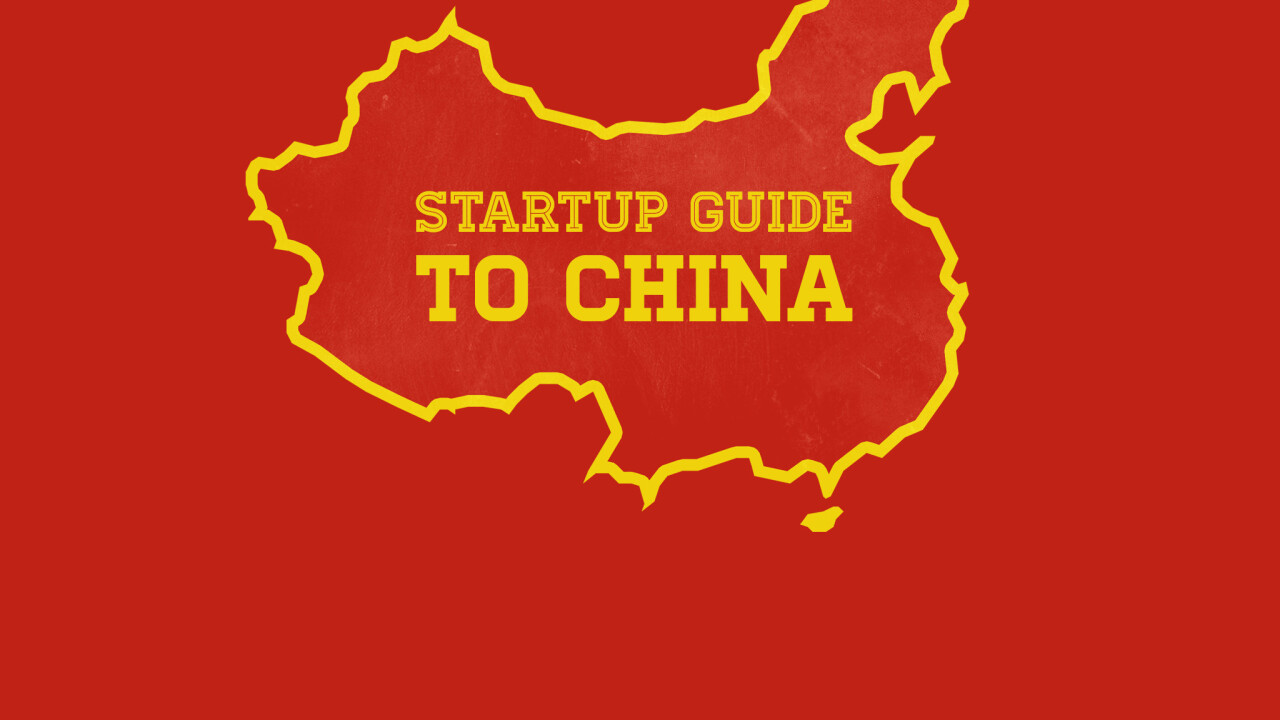
When it comes to captive audiences and potential growth markets, China is as big and as challenging as they come. The adoption of mobile, the Internet and consumer technology is growing at a staggering rate amongst the 1.5 billion residents of the communist country, offering startups opportunities that they are unlikely to find elsewhere.
However, China comes with a huge number of challenges, starting with the language. Mandarin is not easily picked up but it isn’t just communication that daunts those eyeing the market, cultural differences and the uniqueness of the local market necessitates a reliable, on-the-ground partner to help give a business a shot at succeeding there.
Mobile is the center of most opportunities within China’s technology space, as the platform is enabling new levels of communication that had never been envisaged before.
Like many emerging markets and countries outside of the West, PC and fixed line Internet and technology failed to make the widespread impression and impact that it did in the US, Europe and elsewhere. For one thing, computers are expensive and comparative luxuries that are not financially within reach for the average (and perhaps some middle class) Chinese consumer, particularly a few years about before smartphones took off.
Then there is the challenge of technology. While in urban areas the Internet has traditionally been usable and reliable to a point, the quality lessens at second- and third-tier urban areas, let alone those in rural China. So even those that could afford PCs would be constricted by the availability, reliability and cost of Internet access.
Internet cafes sprang up to offer the Web experience, but mobile has the potential to ‘leapfrog’ many Chinese onto the Web in a more meaningful and dedicated way.
To consider the opportunities in China, it is worth clarifying some background on the country’s mobile market. Unlike the US and Europe, high-end smartphones are not leading the mobile Web charge in China as devices like the Apple iPhone or Samsung Galaxy S3 have not traditionally been heavily subsidised – meaning that once again they are out of the financial reach of many.
Instead, mid- and low-end devices have offered a more affordable experience and, with many built on Android or Chinese customisations of it, it is little surprise to see that the Google-owned platform leads the way in China, accounting for 55 percent of smartphone sales in the final quarter of 2011, according to Beijing-based iResearch.
Apple maintains its status as the most aspirational technology firm, and its iPhone devices still attract huge crowd and great attention but the platform does not have the same traction amongst China’s smartphone users, who are estimated to grow to number 200 million by the end of 2012.
There is potential for this balance to tip, and China Unicom and China Telecom — Apple’s two partner carriers in the country — have begun offering fully subsidised iPhone 4S devices. However, at this stage, the price and length of the contracts required are too excess to appeal to those that could not already buy the device outright.
Apple added China Telecom as a partner early this year and that move, the first element of competition around its devices, led to the introduction of subsidised deals, and could see tariffs and prices come down to levels that are more appealing to consumers – although it is likely to gain universal appeal for some time, if ever at all.
That situation could change if Apple can finally agree a tie-up with 660-million subscriber-strong operator China Mobile — the world’s largest carrier — which would then give it a clean sweep of China’s telcos. Such a move has been speculated to take place later this year, and it will rest on whether the Cupertino-based company can produce a device that is compatible
with the unique telecom standard that the operator’s 3G network runs to.
As it stands then, Android enjoys greater adoption in China, however Apple phones (and tablets) are owned by a more affluent and (likely) tech savvy crowd in the country. That, among other factors, makes Apple users a ‘better quality’ consumer for monetisation, but they are spread far thinner. Both platforms have their selling point and are essential for startups focused on the opportunities of mobile.
Key players

Photo Credit: Josh Ong / The Next Web
China’s tech scene has its own very unique ecosystem, thanks in part to the government’s blockage of a number of Western Web giants, which given additional license for Chinese Internet companies to grow. It is unclear exactly how a Western giant would perform in these conditions and, going on the example of Google — which relocated its search engine to Hong Kong in 2010 after clashing with authorities — the precedent is not promising.
Of the key Chinese players, Tencent is the largest based on revenues and market cap, having seen its revenue increase 52 percent year-on-year to hit $1,532.8 million in the first quarter of 2012. The company offers a range of services, but it is mainly focused on entertainment, including games, Weibo microblogging, video and, its primary weapon, QQ messaging service.
Tencent claims QQ has 600 million sign-ups — which is more than China’s 500 million Internet users — and the instant messaging product is present across all of Tencent’s sites, helping to gain attention and usage in way Google would love Google+ to be received.
Tencent (market cap: HK$427.5 billion) also has an active venture capital arm, and its most recent deals include the purchase of a stake in US-based Equity Games. The firm’s Silicon Valley-based team handles a lot of the talent scouting, which is important as Tencent is keen to expand its reach into overseas markets.
Baidu is commonly seen as China’s Google and its an easy comparison to make given that its core strength is search, while it has also branched off into maps, cloud storage, documents, wikis and other Web services that mirror (and even surpass) those offered by its US rival.
While it hasn’t been a big investor in recent times — aside from a $306 million travel portal Qunar — Baidu has publicly pledged its intention to place more focus on acquisitions and investments, and China’s Opera-like UCWeb is thought to have caught its eye, though an investment is more likely than an outright purchase of the browser maker.
Baidu, like many other Chinese firms, is focused on sharpening its mobile offerings in line with the surge of smartphone ownership and mobile Internet usage in the country. With that in mind, it is likely to be concerned with promising startups and acquisition that sit in that area, such as UCWeb.
Sina is a multimedia company that is best known for its Twitter-like Sina Weibo microblogging service, which claims to have 300 million registered users, although that figure may be somewhat inflated by spam accounts and inactive users.
Weibo is Sina’s core product, but it isn’t its only business, and the company runs a popular Internet portal — including one of China’s top technology sites — and has branched out into other services — including video and photo albums — all of which connect back to its Weibo service. The company has a tendency to introduce new products and experiment with services and strategies, rather than make acquisitions.
Like Baidu, Sina is focused on growing its mobile offering and breaking even with its Weibo, which has continued to cost it significant loses in the past. The company is also grappling with the Chinese government’s new policies outlawing anonymous Web users. The company has been slow to implement the ‘real-name’ policy — which necessitates Weibo users to authenticate their identity — and it has already been hit by a partial closure in response to the ‘management’ of sensitive information on its platform.
Sina — which has a $3.34 billion market cap — does self-police Weibo, like others, but the government’s influence is one risk factor that the company has cited for its business.
Youku is China’s biggest Web video site, with a market cap of $2.37 billion, and it is in the process of merging with rival Tudou (market cap: $875 million), which it recently agreed to pick up for more than $1 billion. That deal is tipped to go through in the third quarter of 2012, and it will put pressure on China’s other video space players given the combined resources that the new entity will enjoy.
YouKu executives estimate that the coming together will save the firms $90 million in operating costs, giving it a strong hand to negotiate and cut content deals to increase its appeal.
Though it will become China’s biggest video player by some margin, the merged company will have less than 50 percent market share. That suggests further consolidation, perhaps through M&As or the death of some competitors.
Youku is focused on enhancing its mobile offering and driving profit from the platform, in addition to building a robust selection of unique content. The site has run exclusive entertainment content, and is sure to snap up other prime-time programs with the aim of bringing new users and revenue to its site.
There are plenty more influential players in China, such as $7-billion Netease, social networks Renren and Kaixin, and infrastructure-turned-hardware players Huawei and ZTE, each of which is growing its share in China with a particular focus on driving mobile strategy and business.
Investors
Investment in China is much different to the US model, in which acquisitions are a key exit for many startups and their backers. In China, the IPO has become a significant route which many have taken, with the US a popular place to go public.
However, a combination of factors, including the controversy around the execution of Facebook’s IPO, Groupon’s struggles and the downward spiral of a number of listed Chinese firms, have cast doubt on the IPO route.
Group-buying site Lashou recently cancelled its planned IPO — amidst claims of suspicious accounting — while a number of others have been postponed or called off altogether.
Furthermore, the activity among VC firms active in China has shrunken considerably over the last 18 months. A Thomson Reuters report found that VC investment in the first quarter of 2012 dropped more than 80 percent compared to one year previous. The reduction in IPOs has raised caution, alongside regular China concerns like account fraud and government intervention.
Given the explosion of mobile, which has caught many of the Chinese tech industry off-guard, there is an argument for greater acquisition potential in the market, and a number of US-based investors are showing interest.
Earlier this year, Fidelity Investments announced a $250 million fund targeting the consumer Internet space, while firms including SAIF Partners, Skype founder Niklas Zennström’s Atomico have put money into gaming and mobile related startups.
Accelerators
Dual Chinese-US accelerators are likely to increase as more firms release and wish to explore the opportunities that China offers, with access to local experts and mentors, and, for now, two existing programs stand out.
Chinaccelerator is a Techstars network member that is currently open to applications to enter its second batch of fledgling companies. On its maiden program in 2010, the accelerator, which is led by Frenchman Cyril Ebersweiler, saw three graduates raise combined funding in excess of $1.1 million.
The 4-month long program, which is now backed by Orange, is specifically aimed at software and Web related startups, and it takes on a mix of brand new companies and those that have already gained some level of traction.
The level of funding offered is up to 40,000 Chinese yuan (more than $6,000) but the team offers local expertise and contacts to help graduated startups continue to progress in the country.
InnoSpring launches its first US-Chinese accelerator/seed fund program. The seed program is backed by some big names — including Kleiner Perkins, Northern Light VC and GSR Ventures — while the opening event for the accelerator program drew more than 100 investments, who checked out the first batch of 12 startups.
At this stage, Innospring’s Eugene Zhang revealed that most of the firms involved have roots in China but he is optimistic that, going forward, those with less links to the country will seek involvement in the dedicated Sino-US program.
The 6-month program offers both pre-seed and post-seed programs to help gather talent that can make its mark in China.
App chaos

Photo Credit: Josh Ong / The Next Web
Mobile is clearly a focus for China but the country’s app ecosystem is a confusing and rather unique place, with which traditional models have little comparison.
Third-party app stores rule the roost, and that include unofficial pirate stores, licensed independent app stores, those run by operators, those run by handset makers and, of course, the official stores. Apple’s tight control of its operating system and app platform has kept it in a position of greater control than Google.
The Cupertino firm began accepting local payments last year and, for those with an iPhone or iPad, it remains the central point of call. However, those with jailbroken phones can take their pick from thousands of stores. Though that is an issue Apple faces, the scale is greater in China as consumers are trained to use freemium games, and upfront pricing is not
attractive for many – although Apple’s culture is helping to change this.
Google is in a position with little control. Its Google Play store ‘sells’ only free games, giving it little leverage over the hundreds of app stores that stock free apps for the many flavours and forks of Android devices in the market. The company has revenue sharing deals with official stockists — such as carriers or indy app stores — but it is unclear exactly how
much is being spent on pirated and unofficial content, which is outside of the search giant’s control.
App developers don’t need to ‘go blind’ in China as publishers like The9 and Yodo1 are there on the ground with local expertise and contacts to help revise, market and ultimately sell apps in the country – which is the world’s largest smartphone marketplace.
Henry Fong, CEO of Yodo1 which recently grabbed $2 million in funding, believes that developers must approach both Android and iOS as opportunities, and partnering with a local firm will ensure distribution, a key part of the process, is carried out properly, with apps published to the most suitable app stores and through ideal partners.
Yodo1 even goes so far as to customise game mechanisms, monetisation strategies and other key parts of titles in order than they are optimised to perform, and sell, in China.
That full-level customisation approach is one that applies to startups as much as it does apps, as succeeding in China takes more than just turning up or shipping a product to the country.
Key investors and contacts
While it is true to say that any would-be entrepreneur must do their own homework and research, a few pointers are always appreciated. In a bid to help, we’ve selected 12 tech influencers in China — including a mixture of consultants, bloggers and investors — who are good places and people to go to if you’re interested in exploring the possibilities within China.
Fritz Demopoulos, founder of Queen’s Road Capital: Arguably the most successful foreign entrepreneur in China, founded Qunar
Benjamin Joffe, founder of Plus Eight Star, Mobile Monday Beijing: One of China’s top influencers, Joffe is an angel investor and entrepreneur in his own right.
Kai Lukoff, founder of Tech Rice: Lukoff began TechRice, which quickly became one of the most trusted and influential English-language tech blogs in China. A fluent Mandarin speaker, he is a consultant with app store and content publisher Wandoujia.
Gang Lu, founder of Technode: Lu is one of China’s most prominent tech bloggers, in addition to starting Technode is the founder of a Web printing service and the Open Web Asia group.
Bruno Bensaid, founder of Shanghaivest, Mobile Monday Shanghai: Bensaid began the investment firm which focuses on cross-border mid-cap M&A transactions in 2008
Marc van der Chijs, co-founder of Tudou: One of the most successful foreign founders in China’s tech space. Dutchman van der Chijs is no longer involved in Tudou, instead he now runs fashion site UnitedStyles, but he maintains impressive contacts in China and Asia.
Allen Zhu, partner at GSR Ventures: Former insurance and business development consultant Zhu focuses on investments in Internet, wireless, and enterprise IT.
Jay Chen, founder of China Venture: Former China partner for Softbank, Chen founded China Venture in 2005 after returning to the country, during which time his employers included Bear Stearns and BlackRock.
Gary Rieschel, founder of Qiming Venture Partners: Former Cisco and Intel executive Rieschel founded and runs the $1 billion fund that is focused on early stage investments in China.
Rob McCormack, founder and MD of Mustang Ventures: Formerly with Trident and Morgan Stanley Ventures, McCormack started the venture firm which invests in early stage companies in China.
Gavin Ni, founder of Zero2IPO Group: Zero2IPO provides consultancy to VC and investors in China, and provides market intelligence over the state of China’s investment market.
Feng Deng, founding managing director of Northern Light Venture Capital: Hong Kong-based North Light was founded in 2005 and is focused on early and growth stage opportunities in Greater China. Co-founder Deng was formerly with Juniper Networks, after the company bought Netscreen, a firm he co-founded, for $4.2 billion.
Get the TNW newsletter
Get the most important tech news in your inbox each week.





